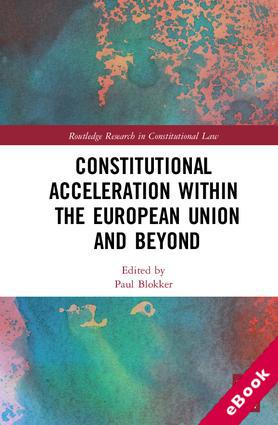
The device(s) you use to access the eBook content must be authorized with an Adobe ID before you download the product otherwise it will fail to register correctly.
For further information see https://www.wildy.com/ebook-formats
Once the order is confirmed an automated e-mail will be sent to you to allow you to download the eBook.
All eBooks are supplied firm sale and cannot be returned. If you believe there is a fault with your eBook then contact us on ebooks@wildy.com and we will help in resolving the issue. This does not affect your statutory rights.
The volume addresses the phenomenon of constitutional acceleration, the increased recourse to constitutional revision and constitution-making - in, as well as on the edges of, contemporary Europe. With constitutional reform becoming less of an exceptional exercise and more of a form of routine politics, and with the scope of constitutional coverage expanding beyond classic constitutional issues, the volume points to a fundamental change in the function of constitutions in that constitutions themselves are becoming the subjects of political contestation rather than framing political debates.
The volume takes an interdisciplinary approach focusing on constitutional politics, understood in terms of context-related interaction between constitutional subjects engaging in constitutional claims and reform also as a means of making political claims. Contributions to the book reflect the extent to which constitutional revision has become an instrument of everyday politics, and maps those actors and forces which foster the resolution of political conflicts through constitutional reform or constitution-making. The book features analysis of constitutional politics in a range of established and new democracies, as well as in post-conflict societies with case studies including Bulgaria, Hungary, Iceland, Ireland, Italy, Romania, the United Kingdom, the Western Balkans and a number of North-African countries. The volume explores critical contemporary challenges to constitutionalism and highlights the need for the involvement of a plurality of actors in constitutional change, as well as endorsements of civic voice and engagement, and the institutionalization of participatory forms of constitutionalism.